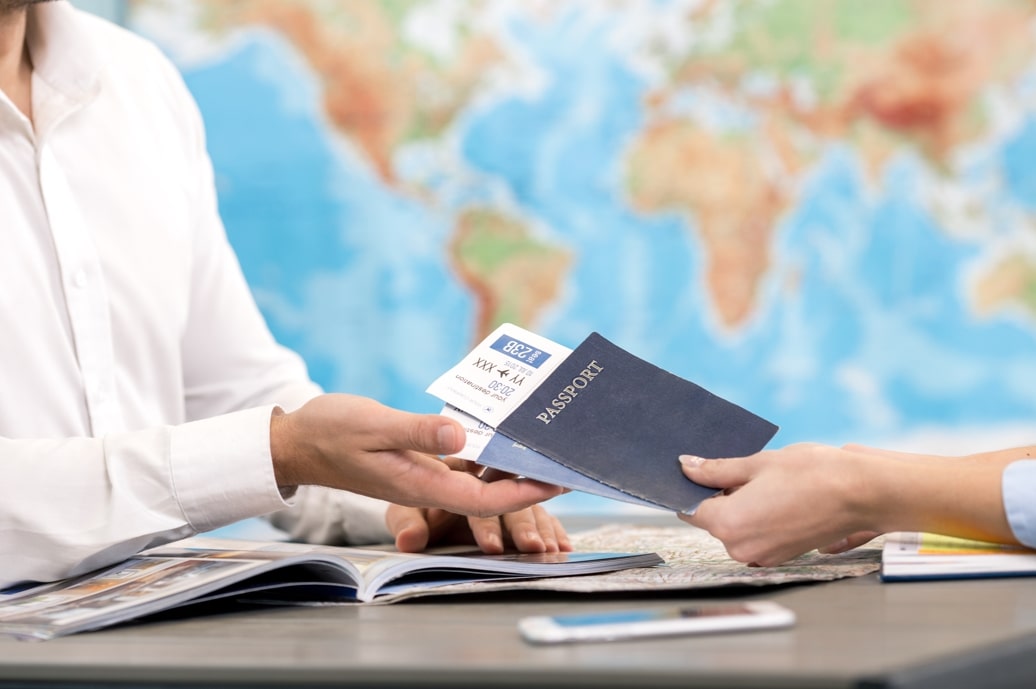The travel industry thrives on personal connections. For agencies navigating a world of ever-changing customer demands and increased competition, a CRM system offers the ultimate solution. It empowers agencies to streamline operations, enhance customer interactions, and build lasting client relationships—all with minimal manual effort.
Discover how a CRM system can revolutionize your travel agency’s operations, increase client satisfaction, and boost revenue. Keep reading for an in-depth guide to harnessing CRM systems tailored for the travel sector.
What is a CRM system
A CRM (Customer Relationship Management) system is a centralized platform that helps businesses organize, manage, and analyze customer interactions throughout the customer journey.
For travel agencies, a CRM system is more than just a database—it’s an operational powerhouse. It captures vital client details like travel preferences, booking history, and communication records, allowing agencies to deliver personalized travel solutions at every stage of the journey. Whether crafting bespoke itineraries or managing group tours, the CRM system ensures seamless coordination, customer satisfaction, and efficiency.
What does a CRM system help you do?
A CRM system offers transformative benefits to travel agencies, addressing challenges like managing client expectations, improving efficiency, and fostering long-term relationships. By centralizing data and automating tasks, CRM systems enable agencies to operate more strategically and deliver exceptional customer experiences. Below, we explore the key ways a CRM system can elevate your agency to new heights.

Personalize travel experiences
Personalization is the cornerstone of modern travel services. A CRM system allows agencies to collect and analyze client data, including booking histories, travel preferences, and even feedback from previous trips. This means agents can craft itineraries that resonate deeply with individual travelers. For example, if a client often chooses destinations with a vibrant food scene, the CRM can highlight such options. This level of personalization not only delights customers but also creates a sense of loyalty and trust in your services.
Streamline communication
Clear and timely communication is essential in the travel business, especially when dealing with clients across different time zones. CRM systems centralize all communication channels, whether it’s email, social media, or live chat. By having all interactions in one place, agencies ensure no question or request goes unanswered. Automation features like scheduling follow-ups and sending reminders further enhance communication efficiency. For example, when a payment deadline approaches, the system can notify both the client and the agent, reducing the risk of missed deadlines or misunderstandings.
Improve lead conversion rates
Turning inquiries into bookings is a key goal for any travel agency. CRM systems help by scoring and categorizing leads, so your team knows where to focus its efforts. Automation tools guide prospects through the sales funnel with timely emails and offers tailored to their needs. For instance, a potential client browsing luxury cruise packages on your website might automatically receive an email highlighting exclusive deals. This targeted approach increases the chances of turning interest into confirmed bookings.
Retain loyal customers
Loyalty is the backbone of long-term success in the travel industry. CRM systems allow agencies to nurture relationships with existing clients through personalized communication and exclusive offers. By analyzing client data, you can identify frequent travelers or those who haven’t booked recently and reach out with customized promotions. A simple birthday greeting with a discount on their next trip can go a long way in reinforcing loyalty and encouraging repeat business.
See SMO in action
Try our solutions with zero commitment
Increase operational efficiency
Efficiency can make or break a travel agency. A CRM system automates repetitive tasks, such as invoice generation, scheduling, and follow-up reminders, so your team can focus on more strategic activities. Additionally, the CRM’s central dashboard provides a bird’s-eye view of all operations, making it easier to track progress and address issues before they escalate. Imagine having all your reservations, client communications, and financial data accessible within a few clicks—it’s a game-changer for operational flow.
Manage group bookings effortlessly
Group travel often involves juggling complex details, from different travel dates to varied accommodation preferences. A CRM system simplifies this by categorizing clients, tracking individual preferences, and managing payments seamlessly. For instance, if a corporate group requires separate invoices for each employee but unified travel arrangements, the CRM handles these intricacies without confusion. This capability not only reduces errors but also enhances the customer experience.
Generate insightful reports
Making informed business decisions requires understanding your agency’s performance and market trends. CRM systems offer robust reporting features that analyze customer behavior, sales data, and marketing campaign outcomes. For example, you can determine which packages are most popular or identify seasonal booking trends. These insights enable you to refine your strategies, allocate resources wisely, and anticipate market shifts effectively.
Integrate with key tools
Running a travel agency often involves using various tools, such as booking platforms, payment gateways, and marketing software. A CRM system acts as the glue that integrates all these tools into a cohesive workflow. This not only minimizes the risk of data entry errors but also saves time by reducing the need to switch between platforms. For instance, when a client confirms a booking, the CRM can automatically trigger the invoicing process and update the travel itinerary.
Stay compliant with regulations
Data privacy and security are critical concerns in today’s travel industry. A robust CRM system ensures compliance with regulations such as GDPR by providing features like encrypted data storage, consent tracking, and detailed audit trails. This not only protects your clients’ information but also safeguards your agency from legal liabilities.
Provide seamless post-trip support
A client’s experience doesn’t end when the trip does. CRM systems allow travel agencies to track post-trip feedback, send thank-you emails, and offer future travel suggestions based on their latest experience. This proactive engagement shows customers you value their opinions and are invested in their satisfaction, paving the way for repeat business and referrals.
With these capabilities, a CRM system becomes more than a tool—it’s the engine driving your agency’s growth and customer satisfaction.
What should you prioritize when choosing a CRM system?

Selecting the right CRM system for your travel agency can feel overwhelming, especially with so many options available. Prioritizing specific features based on your agency’s size, operational goals, and client base can help simplify the decision. Here are the key considerations to guide your choice:
- Ease of use
Your CRM system should enhance efficiency, not complicate processes. Look for an intuitive interface that requires minimal training. The more user-friendly the system, the quicker your team can adapt, ensuring smooth adoption without disrupting daily operations. - Scalability
For smaller travel agencies or startups, affordability might be a key consideration. However, don’t compromise on scalability. As your agency grows and acquires more clients, you’ll need a CRM capable of handling larger data volumes and additional users. Opt for a solution that grows with your business instead of one you’ll outgrow. - Customization options
Every travel agency is unique. Choose a CRM system that allows you to customize pipelines, client categories, and communication templates to suit your specific needs. For example, if you frequently organize niche tours like wildlife safaris, you can configure tags or filters to highlight preferences and trip details. - Integration capabilities
A CRM system that integrates seamlessly with your existing tools—such as booking engines, payment gateways, or marketing software—minimizes workflow disruptions. For instance, automated updates between your booking system and CRM can reduce duplicate data entry and potential errors. - Automation features
Automation is essential for saving time on repetitive tasks. From scheduling follow-ups to generating invoices, a robust CRM system handles these processes efficiently. If you’re managing group bookings, automation can track payments, send reminders, and even update itineraries based on group feedback. - Data security and compliance
Travel agencies handle sensitive customer information, making data security a critical factor. Ensure the CRM complies with industry regulations like GDPR and employs encryption to safeguard client details. Additionally, check for features such as role-based access control to limit data exposure within your team. - Support for multi-channel communication
In the travel industry, clients expect quick responses, whether they contact you via email, phone, or social media. A good CRM system consolidates all communication channels into a single platform, helping agents respond faster and track conversations seamlessly. - Reporting and analytics
Insights are indispensable for refining your strategy. The CRM should provide detailed reports on client activity, sales funnels, and campaign performance. If your agency targets diverse market segments, the ability to filter data by demographics or trip preferences will be invaluable. - Cost-effectiveness
For agencies on tighter budgets, cost often dictates choice. Opt for systems with flexible pricing models, like monthly subscriptions or pay-per-user plans. Consider whether additional features are worth the expense and ensure you only pay for what aligns with your needs. - Mobile accessibility
For agencies with remote or on-the-go team members, a mobile-friendly CRM ensures uninterrupted access to vital client and operational data. Look for apps or web versions optimized for smartphones, enabling agents to handle bookings and resolve issues anytime, anywhere.
See SMO in action
Try our solutions with zero commitment
Tailoring CRM choices for specific needs
- For small agencies: Prioritize affordability, simplicity, and essential tools for managing a limited number of clients.
- For agencies focused on niche travel: Choose systems with advanced segmentation and customization options.
- For rapidly growing businesses: Focus on scalability, automation, and robust data management features.
By aligning your priorities with your operational goals and client demands, you can make an informed decision that transforms your agency’s efficiency and client relationships.
Wrapping up
The travel industry thrives on relationships, efficient communication, and personalized experiences—all of which can be optimized through a well-implemented CRM system. For travel agencies, leveraging CRM technology isn’t just about convenience; it’s about transforming how you serve your customers while improving operational efficiency. From managing complex group bookings to crafting unforgettable travel experiences, a CRM system provides the structure and insights needed to remain competitive in a fast-evolving market.
Choosing the right CRM requires thoughtful consideration of your agency’s unique needs, from budget constraints to client engagement strategies. Prioritize solutions that align with your goals and offer scalability for future growth. By doing so, you ensure your agency remains adaptable, innovative, and positioned for long-term success.


